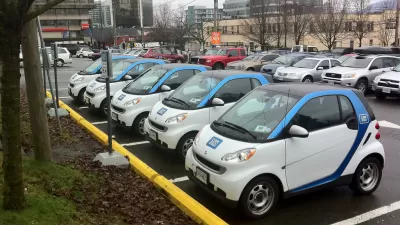Car sharing networks that allow the vehicle to be returned to any location were found to have the impact of removing seven cars for each rented car in San Diego in a three-year study released July 19.

A new study, "Impacts of car2Go on Vehicle Ownership, Modal Shift, Vehicle Miles Traveled and Greenhouse Gas Emissions: An Analysis of Five North American Cities," by University of California, Berkeley Transportation Sustainability Research Center researchers Elliot Martin and Susan Shaheen, looked at the effects of car sharing in San Diego, Vancouver, Calgary, Seattle, and Washington, D.C.
"The study focused on car sharing offered by car2Go because that company allows people to pick up a car in one place and drop it off elsewhere, unlike some other car share providers that require cars to be picked up and dropped off in the same place," reports David Garrick for The San Diego Union-Tribune. "That allows commuters to use the network to eliminate the 'last mile' problem.”
Sustainability
Car sharing is a key element of the city’s ambitious climate action plan, which aims to cut carbon emissions in half by 2035.
Greater VMT reductions were found in Vancouver, Calgary, Seattle and Washington, D.C.
Increase sustainability by renting electric vehicles?
Car2go made San Diego the only North American city with an all-electric fleet when it launched service here five years ago, increasing the local network’s role in preventing pollution and greenhouse gases.
But company officials decided this spring that an electric model was unsustainable and switched all of their vehicles to gas-powered in May.
Last mile solution?
Interestingly, a post last year about Car2Go's expansion to Queens, N.Y asked, "Last Mile Solution or Congestion Nightmare?"
"Some experts question how efficient Car2go will be at improving outer-borough mobility," reported Matthew Flamm for Crain's New York Business. "Richard Barone, director of transportation programs for the Regional Plan Association, thinks the service could help with the 'last mile' problem often found outside Manhattan, where people can live a long way from the nearest subway stop."
There's no reason to think that the results in New York City would be any different from the other four cities studied.
“Our exhaustive, three-year research effort into one-way carsharing reveals that car2go vehicles result in fewer privately-owned vehicles on the road, fewer vehicle miles traveled and a reduction in greenhouse gas emissions,” said Susan Shaheen, Co-Director of TSRC in a UC Berkeley, Institute of Transportation Studies news release.
Participation from car2go and its members, the largest free-floating one-way carsharing service in North America, gave us unprecedented access and insight into how this kind of innovative mobility service is impacting North American cities.
Look for the results from another study by the Transportation Sustainability Research Center on the sustainability of transportation network (ride hailing) companies like Uber previously announced here.
Car2Go is a division of Daimler, a German multinational automotive corporation perhaps best known for its Mercedes-Benz vehicles.
Hat tip to Metro L.A. Transportation Headlines
FULL STORY: Study: Car-sharing reduces pollution, cars

Maui's Vacation Rental Debate Turns Ugly
Verbal attacks, misinformation campaigns and fistfights plague a high-stakes debate to convert thousands of vacation rentals into long-term housing.

Planetizen Federal Action Tracker
A weekly monitor of how Trump’s orders and actions are impacting planners and planning in America.

San Francisco Suspends Traffic Calming Amidst Record Deaths
Citing “a challenging fiscal landscape,” the city will cease the program on the heels of 42 traffic deaths, including 24 pedestrians.

Defunct Pittsburgh Power Plant to Become Residential Tower
A decommissioned steam heat plant will be redeveloped into almost 100 affordable housing units.

Trump Prompts Restructuring of Transportation Research Board in “Unprecedented Overreach”
The TRB has eliminated more than half of its committees including those focused on climate, equity, and cities.

Amtrak Rolls Out New Orleans to Alabama “Mardi Gras” Train
The new service will operate morning and evening departures between Mobile and New Orleans.
Urban Design for Planners 1: Software Tools
This six-course series explores essential urban design concepts using open source software and equips planners with the tools they need to participate fully in the urban design process.
Planning for Universal Design
Learn the tools for implementing Universal Design in planning regulations.
Heyer Gruel & Associates PA
JM Goldson LLC
Custer County Colorado
City of Camden Redevelopment Agency
City of Astoria
Transportation Research & Education Center (TREC) at Portland State University
Jefferson Parish Government
Camden Redevelopment Agency
City of Claremont



























